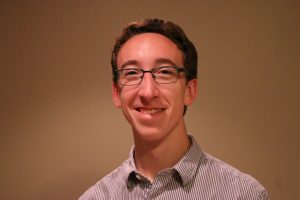Q&A with Reed Puleo, percussion
 This past summer the Bowdoin International Music Festival welcomed 255 student participants from 27 countries and 30 states, including 17 remarkable Festival Fellows. Sixty-five percent of these participants received scholarship funds from the Festival. In celebration of an incredible 2016 season and in anticipation of an even better 2017 season, we’ve reached out to last year’s participants to reflect on their experience at the Festival and their lives as musicians.
This past summer the Bowdoin International Music Festival welcomed 255 student participants from 27 countries and 30 states, including 17 remarkable Festival Fellows. Sixty-five percent of these participants received scholarship funds from the Festival. In celebration of an incredible 2016 season and in anticipation of an even better 2017 season, we’ve reached out to last year’s participants to reflect on their experience at the Festival and their lives as musicians.
BIMF: What are some of your earliest musical memories?
Reed: I remember being in a program called “Kindermusic” when I was three. My mom would bring me with her close friend and her son where we all sat and listened to someone play guitar. One special activity we did was making a guitar out of a tissue box and rubber bands.
BIMF: At what age did you start playing your instrument?
Reed: I started playing percussion in 3rd grade when I was eight.
BIMF: What’s the longest you’ve spent preparing a piece of music?
Reed: Seven or eight months. It was my 4-mallet marimba solo for my college auditions.
BIMF: If you could play with any musician who would it be and why?
Reed: I would enjoy playing in a piece with all my teachers, past and present. They all bring something totally different to the table, but would get along very well. I know I was only supposed to pick one person, but that’s impossible. A piece performed by me, my previous teacher Ken Piascik, and current teachers Doug Perkins, Samuel Solomon, Nancy Zeltsman, and Kyle Brightwell would be one for the ages.
BIMF: How would you explain your passion for chamber music to a non-musician?
Reed: Chamber music is when I actually get to play, unlike most times in the orchestral percussion setting, which can still be awesome. I love learning challenging music and problem solving, and getting to work intimately with only a handful of other people. Often times it brings non-percussionists out of their comfort zone when they play with us, and I enjoy being part of their personal growth.
BIMF: How do you make a well-known piece of music your own?
Reed: I usually don’t play well-known pieces of music. The only people who know almost any music I enjoy playing are percussionists. I usually try to go even further and play music that is also unfamiliar to percussionists. I enjoy breaking the grind and being different.
BIMF: What was one highlight of the 2016 Festival for you?
Reed: Playing some of my stranger solo repertoire at one of the Young Artist Concerts. I was able to finally perform two pieces that I connect with very personally and enjoy playing with an actual audience and not just my parents, studio mates, or other percussionists. I’m glad I stuck out – I’m pretty sure after I played pieces by a composition teacher from BoCo and Carter, a Schubert Quartet was right after me – so drastically different that it really threw the audience for a loop. It’s okay if they weren’t particularly fond of it, I’m just glad they listened with open ears.
BIMF: What’s next for you after the Festival?
Reed: I’ll be a sophomore in college at the Boston Conservatory at Berklee. After I graduate I hope to form a contemporary chamber group that performs both contemporary staples (Carter, Reich, Wuorinen), as well as newly commissioned works.
BIMF: What advice would you offer to an aspiring musician?
Reed: Find the thing that makes you unique and don’t hesitate to show people who you are, and never second guess yourself.
